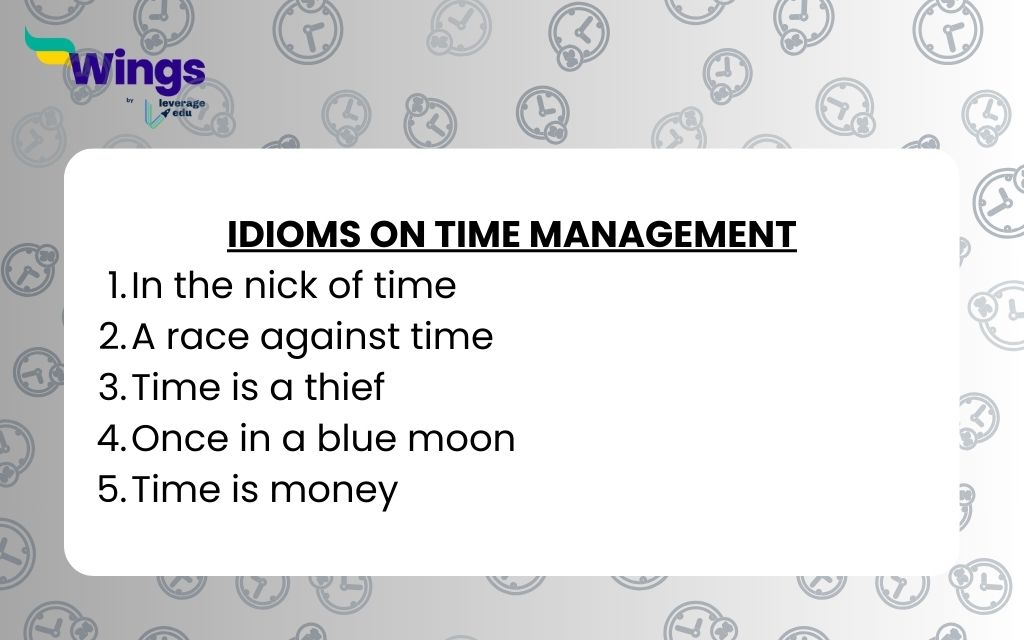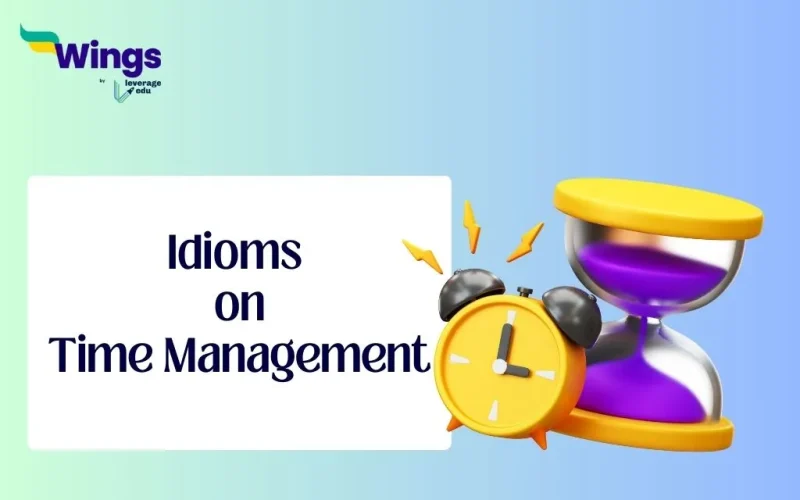Idioms of time management are phrases that use figurative language to convey concepts related to time. They often offer unique and memorable ways to express ideas about waiting, passing time, deadlines, and the value of time. One of the most famous idioms on time would be ‘time is money’ which means that time is valuable and should be used wisely, just like money. To learn more such idioms on time then make sure you stay put to this blog. Make sure you keep reading this article to understand some of the best idioms on time management that you can utilise in your life.
This Blog Includes:
Check out more blogs on Idioms from scratch here!
11+ Popular Idioms on Time Management with Meanings
Check out some of the popular idioms on time management, along with their meanings, which will help you enhance your English writing and bring variety to your writing.

Time is money
This idiom implies that time is valuable and should be used wisely as if it were a resource like money. It implies that wasting time can be costly, both in terms of missed opportunities and lost productivity.
Example: She’s very efficient and always makes the most of her time.
Time is on my side
The idiom “Time is on my side” means that the passage of time is working in one’s favour. It suggests that the situation is improving over time, or that there is enough time to achieve a goal.
Example: I’m not worried about this project deadline. Time is on my side and I have plenty of time to finish it.
In the nick of time.
One of the most heard idioms on time management means just at the right moment, often narrowly avoiding a negative consequence. It implies a situation where something happens at the very last possible moment, preventing a bad outcome.
Example: I arrived at the airport just in the nick of time; my flight was about to board.
Time waits for no one.
This saying implies that time passes relentlessly and is not affected by anyone’s actions or desires. It implies that we should make the most of our time and not waste it, as opportunities and moments will not be repeated.
Example: He spent years procrastinating, but eventually realized that time waits for no one. He finally started working towards his goals.
A race against time.
A situation where something must be done quickly to avoid negative consequences. It implies a pressing deadline or a limited amount of time to achieve a goal.
Example: The company faced a race against time to meet the tight deadline for the new product launch.
Time is a great teacher.
This is one of the most valuable idioms on time management that talks about life experiences and the passage of time that can provide valuable lessons and wisdom. It suggests that through facing challenges, making mistakes, and observing the world around us, we can gain deep insights and understanding.
Example: It’s said that time is a great healer, and I believe that’s true. With time, even the deepest wounds can mend.
Time is a thief.
It implies that time can be seen as a force that steals opportunities, youth, and experiences from us as it passes. It suggests that time is fleeting and can be lost irrevocably.
Example: I regret not spending more time with my loved ones. Time is a thief that cannot be turned back.
Time is of the essence.
It means that time is extremely important and must be used wisely or efficiently. It implies that there is a limited amount of time available to complete a task and that delays or wasting time can have serious consequences.
Example: We need to hurry; time is of the essence.
A stitch in time saves nine.
One of the most popular idioms on time management means that it is better to address a problem early on before it becomes more serious and difficult to solve. The idea is that a small effort to fix something initially can prevent much larger problems and more significant effort later.
Example: When I noticed a small hole in my tent, I quickly patched it up. It saved me from getting soaked in the rain later that night.
Time is a great healer.
As the idiom suggests it implies that the passage of time can help people to recover from emotional pain, loss, or trauma. It suggests that over time, people can learn to cope with difficult experiences and find a sense of peace or closure.
Example: The old saying ‘time is a great healer’ is true. Even the most painful experiences can be overcome with time
Too much time on my hands.
This idiom means that someone has a lot of free time and is bored or looking for something to do.
Example: Since I lost my job, I’ve had too much time on my hands. I’ve been trying to find a new hobby to keep myself busy.
Once in a blue moon.
One of the most common English idioms on time management refers to the phenomenon of a second full moon occurring in a single calendar month, which happens approximately every two to three years.
Example: I only see my old friend, Sarah, once in a blue moon now that we live in different cities.
Check more blogs on Idioms
FAQs on Idioms on Time Management
The top 5 idioms on time management include ‘time is on my side’, ‘time is money’, ‘time is a thief’, ‘a snitch in time saves nine’, and ‘time is of the essence’ among others.
The correct idiom for being ‘right on time’ is ‘on the dot.’
Some of the best phrases for being on time include ‘prompt’, ‘punctual’, ‘right on time’, ‘right on the dot’, ‘here on time’ and others.‘
This was all about the “Idioms on Time Management.” You can also follow the Learn English page of Leverage Edu for more exciting and informative blogs related to English grammar and the English language.


 One app for all your study abroad needs
One app for all your study abroad needs












 60,000+ students trusted us with their dreams. Take the first step today!
60,000+ students trusted us with their dreams. Take the first step today!